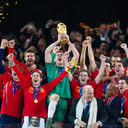“Well, we’ve been playing pretty well,” said England head coach Gareth Southgate after beating Scotland in Tuesday night’s friendly at Hampden Park. “I know that the roof caved in at the weekend because it wasn’t the performance people wanted,” he added.
It was a chuckling response to the hot-headedness of many England fans after the team’s failure to beat Ukraine in Saturday’s Euro 2024 qualifier. Southgate said after the 1-1 draw that the “attacking players didn’t quite click”, but England were hardly disastrous: 68 per cent possession, two shots faced and one on target, which was the goal.
Advertisement
“We know the cycle with England,” said Southgate before facing Scotland. “I’ve been in the job long enough now. It’s constant (criticism), it’s never-ending. But we have to focus internally on what’s important for us.“
The internal review from the win at Hampden Park was likely: job done. “We were excellent in all phases of the game, right from the start,” said Southgate. “We wanted to control the crowd by using the ball well and showing composure, and I thought we did that really well.”
Sixty per cent possession, no shots on target conceded, and a 3-1 away win against a side with a perfect Euro 2024 qualifying record that included a win over Spain on this ground in March. England played the game, not the occasion, showing maturity and ruthlessness, with six changes to the team that drew with Ukraine.
600 – England earned their 600th victory in all competitions, becoming the first European nation to reach this milestone in international football. Leaders. pic.twitter.com/tPATSmAKbL
— OptaJoe (@OptaJoe) September 12, 2023
All three goals were flowing passing sequences where England played through Scotland’s 5-4-1 defensive block. “We were a threat, we had runners in behind,” said Southgate.
The third goal was the pick of the bunch. England responded excellently to Harry Maguire’s own goal, limiting Scotland’s spell of momentum. The attacking sequence lasted 78 seconds, 20 passes, and every player touched the ball. It started when Kyle Walker collected a loose ball after England had a corner cleared…

Aaron Ramsdale hit it long back to the initial corner taker, Kieran Trippier, but he had no options so recycled possession. After England regained their attacking shape, Walker slid a pass to Kalvin Phillips and he played it to Bukayo Saka.

Under pressure, Saka dribbled backwards and passed to Maguire. Maguire split Scotland’s midfield to Eberechi Eze, who set it to Trippier.

Then England turned it on. Trippier found Declan Rice’s forward run, and he spotted Bellingham between the lines.

Bellingham expertly turned out of trouble, dribbled forward until Kieran Tierney stepped out and then poked it through to Harry Kane. He scored.

Southgate stressed it was a “different game, different pitch, different opposition” to the match in Poland against Ukraine, who “sat really deep, made it hard to find space”. “Tonight there was space for runners,” he added. “It’s just a different match, really.”
The expectation of perfection for England and Southgate is unforgiving.
For perspective, it is worth noting that Italy drew 1-1 in North Macedonia on Saturday, a team England swept aside 7-0 in the last international break. England are six points clear at the top of Group C, having played one more match than second-placed Italy, who appointed Luciano Spalletti as head coach last month following Roberto Mancini’s move to become head coach of Saudi Arabia.
Advertisement
Almost every other European nation has changed their head coach or manager this year. England were one of six European nations to exit the Qatar World Cup in the round of 16 or quarter-finals but only they and Switzerland (Murat Yakin) still have their head coaches from that tournament. International management is following club football’s lead for ever-decreasing tenures.
Ronald Koeman has replaced Louis van Gaal for his second stint as head coach of the Netherlands; Portugal sacked Fernando Santos and brought in Roberto Martinez; Santos was then hired by Poland, who had given Czeslaw Michniewicz just 11 months in charge, only to be sacked himself on Wednesday after only six games. Spain are transitioning under Luis de la Fuente after Luis Enrique departed following Spain’s loss at the World Cup to Morocco. They won the Nations League this summer but have not reached a major final since winning Euro 2012.
A tweet last year from Luis Enrique, now manager of Paris Saint-Germain, was captioned “just to put things in context” and tried to make the case that Spain were relatively successful in his tenure.
Solo por poner las cosas en contexto… pic.twitter.com/AZRn4C0cEq
— LUISENRIQUE (@LUISENRIQUE21) September 28, 2022
That longitudinal comparison is needed to truly appreciate Southgate’s success.
They qualified from the groups at the last three major tournaments for the first time since the early 2000s, when they were managed by Sven-Goran Eriksson, and even then they won just two knockout games, the latter being against Ecuador at World Cup 2006. It took England 12 years to prevail in another, beating Colombia on penalties under Southgate in 2018.

Southgate has taken England from being a team that could not compete with continental Europe’s best for success or style, and has made serious inroads in both. England ranked second for possession (62.8 per cent) behind Spain at the World Cup, with those the two youngest European sides at the tournament.

“There are some young players in there especially, where the step we have to make is to have that belief and that confidence in those big games,” said Southgate after England’s World Cup quarter-final loss to France.
The style is, at worst, defensive and pragmatic, and it helps that England have match-winners at both ends of the pitch. But those are all trademark features of tournament-winning sides.
Even counter-arguments that Southgate has been ‘lucky’ to have a quality generation of players ignore his years as England Under-21s coach and the way he established a pathway from the youth teams to the senior setup.
England youth 2017-18:
Euro U17 2017 🥈
Euro U17 2018 SF
Euro U19 2017 🏆
Euro U19 2018 GS
World Cup U17 🏆
World Cup U20 🏆
Euro U21 SF10 players from these teams are at Euro 2020: Pickford, Henderson, Chilwell, James, Mount, Foden, Grealish, Sancho, Saka & Calvert-Lewin. 🏴 pic.twitter.com/ewa3zgoqVS
— Football Talent Scout – Jacek Kulig (@FTalentScout) June 10, 2021
Only six European countries have qualified from the groups at the last three major tournaments (2018 and 2022 World Cups, Euro 2020): England, Portugal, Spain, Switzerland, Croatia and France.
England, France and Croatia are the only ones to reach multiple semi-finals. England’s Nations League wobble pre-World Cup — coming bottom of the group without winning a game — pales in comparison to the collapses of others.
Italy have failed to make a World Cup in Southgate’s tenure. Belgium’s golden generation looks to be finished after a group-stage exit in Qatar. Germany, who sacked Hansi Flick this window, crashed out in the groups at the last two World Cups.
France are the ultimate outlier. They knocked England out of the World Cup quarter-finals in Qatar en route to becoming the first country to reach consecutive World Cup finals since Brazil (1994, 1998, 2002), and are the only European nation above England in the FIFA rankings. Head coach Didier Deschamps, in charge since 2012, proves that success is achievable with longevity.
Advertisement
Deschamps has faced serious scrutiny, for a pragmatic style, his loyalty with call-ups (notably continuing to pick No 9 Olivier Giroud and excluding Karim Benzema) and starting XIs not being attack-minded enough, particularly given France’s abundance of quality forwards. All three are also criticisms of Southgate.
Deschamps’ France teams have rarely been viewed as the most exciting, entertaining or dominating, but they have consistently outperformed everyone else and shown the features of a World Cup-winning side. It took him six years to win a trophy and, like Southgate, he has lost a European Championship final on home soil (2016).

GO DEEPER
How to win the World Cup: The lessons teams can learn from previous winners
England’s loss to Deschamps’ France in Qatar was, in Southgate’s words, “fine margins”.
“We wanted to be bold in the tournament and we went toe to toe with them,” he said. “I have been involved in nights where we have played top teams and been on the back foot for the majority of the game.”
England had 57 per cent possession and twice as many shots (16 versus eight). Southgate maintained the same starting XI from the round of 16, a significant step — in previous tournaments, he had been more pragmatic and switched to a 3-4-3 for an extra defender. Right-back Walker played deeper to cover for French talisman Kyliann Mbappe, whose threat was mostly negated.

England have stuck with the 4-3-3 post-World Cup. The left side needs work; full-back Ben Chilwell was exposed against Ukraine and James Maddison had a limited impact in a ‘false’ left-winger role, but Southgate’s slight tactical variations on the right are elevating England to the next level.
Walker played a similar role against Ukraine, where Southgate praised “his cover of a very good winger” against Mykhailo Mudryk. That the two never truly got into a race is a tactical success.

Southgate’s explicit support for Maguire after the Scotland game was significant. He and John Stones will likely be England’s centre-back pairing in Germany next summer, and it is worth remembering Maguire has played excellently in three major tournaments for England. His loss of captaincy and place at Manchester United is seriously problematic, though, and Levi Colwill could be the successor.
Advertisement
Jude Bellingham and Rice are two of the best central midfielders in the world, and a complementary pairing. Upgrading Jordan Henderson, 33 and no longer playing in the Premier League, is an essential next step for Southgate before next summer’s tournament in Germany.
He has experimented with Trent Alexander-Arnold in midfield, which he says gives England “something different”. Alexander-Arnold’s expansive and incisive passing range was pivotal in dissecting North Macedonia and Malta’s mid-blocks, but in his absence against Ukraine, England relied on Kane’s playmaking and struggled.
Southgate moved to a 4-2-3-1 against Scotland, with Rice and Phillips in a double pivot behind Bellingham, wearing No 10 and playing like one.

“Scotland’s system is difficult to play against, so we slightly changed our system, because we needed to get pressure on them all over the pitch and he (Bellingham) did that really well,” Southgate said afterwards.
Accommodating, tweaking and tinkering, rather than making big personnel overhauls, is part of France’s success under Deschamps. Antoine Griezmann, a No 10 in 2018, moved to a deeper midfield role in Qatar, while Mbappe switched from right to left wing. They overcame an injury crisis, with Theo Hernandez at left-back to add creativity.

GO DEEPER
France's 2018 vs France 2022 - how have Deschamps' side evolved tactically?
Southgate has learnt from the failures of England’s ‘golden generation’ in the 2000s — the 11 best players do not always make the best starting XI.
For all the criticisms, 2022 was England’s most productive attack at a World Cup (13 goals), and they only played five games.
Southgate has the most major tournament wins (12, including penalty shootouts) of any England head coach or manager and his six knockout wins in three major tournaments are as many as England had in 48 years prior.
“We were here to try to win the tournament — we had belief we could. We’ve got a team that could have done that,“ said Southgate after the World Cup exit.
They will have the same intentions and belief in Germany next summer, where the pressure will be on Southgate to lift the roof rather than having to discuss it caving in.

GO DEEPER
Average reign of a manager has halved in a decade - and is only getting shorter
